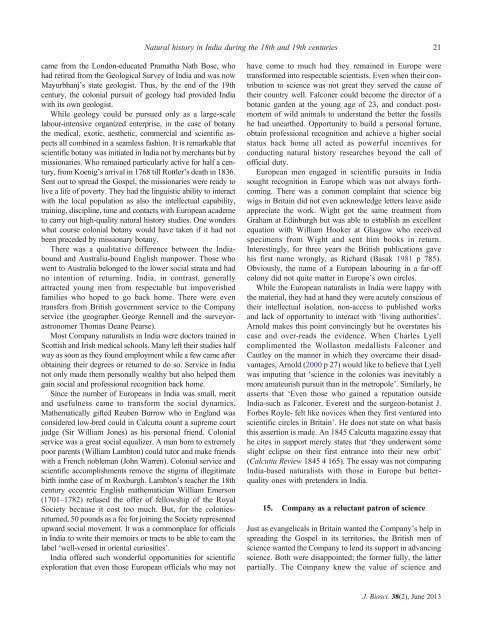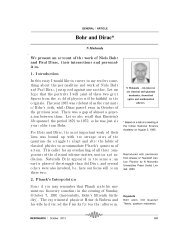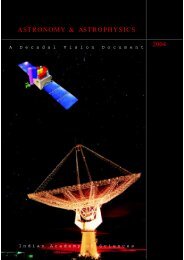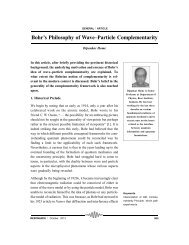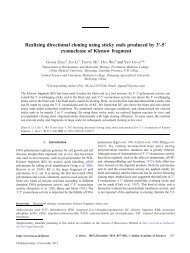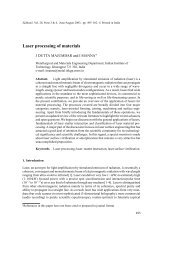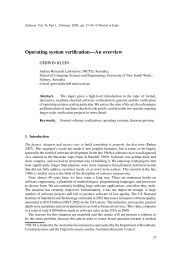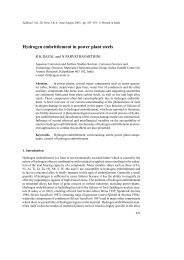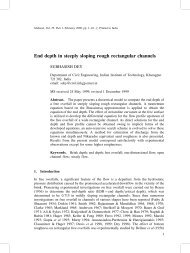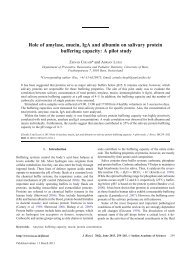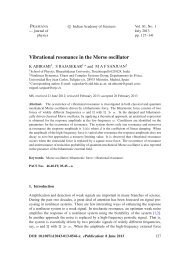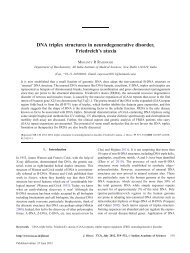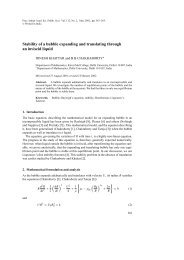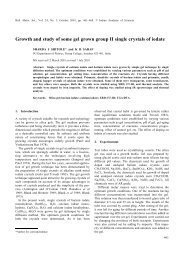Perspectives - Indian Academy of Sciences
Perspectives - Indian Academy of Sciences
Perspectives - Indian Academy of Sciences
Create successful ePaper yourself
Turn your PDF publications into a flip-book with our unique Google optimized e-Paper software.
Natural history in India during the 18th and 19th centuries 21<br />
came from the London-educated Pramatha Nath Bose, who<br />
had retired from the Geological Survey <strong>of</strong> India and was now<br />
Mayurbhanj’s state geologist. Thus, by the end <strong>of</strong> the 19th<br />
century, the colonial pursuit <strong>of</strong> geology had provided India<br />
with its own geologist.<br />
While geology could be pursued only as a large-scale<br />
labour-intensive organized enterprise, in the case <strong>of</strong> botany<br />
the medical, exotic, aesthetic, commercial and scientific aspects<br />
all combined in a seamless fashion. It is remarkable that<br />
scientific botany was initiated in India not by merchants but by<br />
missionaries. Who remained particularly active for half a century,<br />
from Koenig’s arrival in 1768 till Rottler’s death in 1836.<br />
Sent out to spread the Gospel, the missionaries were ready to<br />
live a life <strong>of</strong> poverty. They had the linguistic ability to interact<br />
with the local population as also the intellectual capability,<br />
training, discipline, time and contacts with European academe<br />
to carry out high-quality natural history studies. One wonders<br />
what course colonial botany would have taken if it had not<br />
been preceded by missionary botany.<br />
There was a qualitative difference between the Indiabound<br />
and Australia-bound English manpower. Those who<br />
went to Australia belonged to the lower social strata and had<br />
no intention <strong>of</strong> returning. India, in contrast, generally<br />
attracted young men from respectable but impoverished<br />
families who hoped to go back home. There were even<br />
transfers from British government service to the Company<br />
service (the geographer George Rennell and the surveyorastronomer<br />
Thomas Deane Pearse).<br />
Most Company naturalists in India were doctors trained in<br />
Scottish and Irish medical schools. Many left their studies half<br />
way as soon as they found employment while a few came after<br />
obtaining their degrees or returned to do so. Service in India<br />
not only made them personally wealthy but also helped them<br />
gain social and pr<strong>of</strong>essional recognition back home.<br />
Since the number <strong>of</strong> Europeans in India was small, merit<br />
and usefulness came to transform the social dynamics.<br />
Mathematically gifted Reuben Burrow who in England was<br />
considered low-bred could in Calcutta count a supreme court<br />
judge (Sir William Jones) as his personal friend. Colonial<br />
service was a great social equalizer. A man born to extremely<br />
poor parents (William Lambton) could tutor and make friends<br />
with a French nobleman (John Warren). Colonial service and<br />
scientific accomplishments remove the stigma <strong>of</strong> illegitimate<br />
birth innthe case <strong>of</strong> m Roxburgh. Lambton’s teacher the 18th<br />
century eccentric English mathematician William Emerson<br />
(1701–1782) refused the <strong>of</strong>fer <strong>of</strong> fellowship <strong>of</strong> the Royal<br />
Society because it cost too much. But, for the coloniesreturned,<br />
50 pounds as a fee for joining the Society represented<br />
upward social movement. It was a commonplace for <strong>of</strong>ficials<br />
in India to write their memoirs or tracts to be able to earn the<br />
label ‘well-versed in oriental curiosities’.<br />
India <strong>of</strong>fered such wonderful opportunities for scientific<br />
exploration that even those European <strong>of</strong>ficials who may not<br />
have come to much had they remained in Europe were<br />
transformed into respectable scientists. Even when their contribution<br />
to science was not great they served the cause <strong>of</strong><br />
their country well. Falconer could become the director <strong>of</strong> a<br />
botanic garden at the young age <strong>of</strong> 23, and conduct postmortem<br />
<strong>of</strong> wild animals to understand the better the fossils<br />
he had unearthed. Opportunity to build a personal fortune,<br />
obtain pr<strong>of</strong>essional recognition and achieve a higher social<br />
status back home all acted as powerful incentives for<br />
conducting natural history researches beyond the call <strong>of</strong><br />
<strong>of</strong>ficial duty.<br />
European men engaged in scientific pursuits in India<br />
sought recognition in Europe which was not always forthcoming.<br />
There was a common complaint that science big<br />
wigs in Britain did not even acknowledge letters leave aside<br />
appreciate the work. Wight got the same treatment from<br />
Graham at Edinburgh but was able to establish an excellent<br />
equation with William Hooker at Glasgow who received<br />
specimens from Wight and sent him books in return.<br />
Interestingly, for three years the British publications gave<br />
his first name wrongly, as Richard (Basak 1981 p785).<br />
Obviously, the name <strong>of</strong> a European labouring in a far-<strong>of</strong>f<br />
colony did not quite matter in Europe’s own circles.<br />
While the European naturalists in India were happy with<br />
the material, they had at hand they were acutely conscious <strong>of</strong><br />
their intellectual isolation, non-access to published works<br />
and lack <strong>of</strong> opportunity to interact with ‘living authorities’.<br />
Arnold makes this point convincingly but he overstates his<br />
case and over-reads the evidence. When Charles Lyell<br />
complimented the Wollaston medallists Falconer and<br />
Cautley on the manner in which they overcame their disadvantages,<br />
Arnold (2000 p 27) would like to believe that Lyell<br />
was imputing that ‘science in the colonies was inevitably a<br />
more amateurish pursuit than in the metropole’. Similarly, he<br />
asserts that ‘Even those who gained a reputation outside<br />
India-such as Falconer, Everest and the surgeon-botanist J.<br />
Forbes Royle- felt like novices when they first ventured into<br />
scientific circles in Britain’. He does not state on what basis<br />
this assertion is made. An 1845 Calcutta magazine essay that<br />
he cites in support merely states that ‘they underwent some<br />
slight eclipse on their first entrance into their new orbit’<br />
(Calcutta Review 1845 4 165). The essay was not comparing<br />
India-based naturalists with those in Europe but betterquality<br />
ones with pretenders in India.<br />
15. Company as a reluctant patron <strong>of</strong> science<br />
Just as evangelicals in Britain wanted the Company’s help in<br />
spreading the Gospel in its territories, the British men <strong>of</strong><br />
science wanted the Company to lend its support in advancing<br />
science. Both were disappointed; the former fully, the latter<br />
partially. The Company knew the value <strong>of</strong> science and<br />
J. Biosci. 38(2), June 2013


